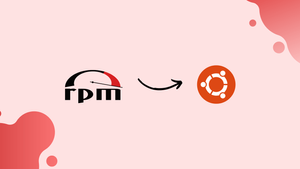Choose a different version or distribution
Introduction
Before we begin talking about how to install RPM packages on Ubuntu 22.04. Let’s briefly understand - What is an RPM package?
RPM packages are a popular way to distribute software on Linux systems. RPM stands for "Red Hat Package Manager" and refers to the format used to package software and its dependencies. These packages contain all the necessary files, such as executables, libraries, and configuration files, required for the software to function properly.
RPM packages simplify software installation, updates, and removal by providing a standardized format that can be easily managed using package management tools. They are widely used by Linux distributions like Red Hat, CentOS, Fedora, and others, making it effortless for users to install and maintain software on their systems.
In this tutorial, you will install RPM packages on Ubuntu 22.04. We will also address some of the FAQs related to the RPM installation.
Advantages of RPM packages
- Easy Installation: RPM packages simplify software installation on Linux systems.
- Dependency Management: RPM handles dependencies automatically, ensuring all required software components are installed.
- Version Control: RPM allows easy tracking of software versions and updates.
- System Compatibility: RPM packages are designed to work seamlessly with various Linux distributions.
- Uninstallation: RPM makes it effortless to remove software and associated files from the system.
Step 1- Installing the Alien
1) Alien is a tool supporting conversions between Red Hat rpm, Debian deb, and Stampede slp, as well as Slackware tgz, and the Solaris pkg file formats. Before installing the alien package, remember that Universe repository is enabled on your system using the following command:
sudo add-apt-repository universe
2) After enabling the repository, you will have to update the packages index and proceed to install the alien package using:
sudo apt update
sudo apt install alien
The above command will also install other necessary build tools.
Step 2 - Converting and Installing the RPM package
1) After that, to convert a package from RPM to the DEB format, you will use alien command with RPM package name:
sudo alien package_name.rpm
2) Usually, depending on the package size, the conversion will take some time. In many cases, you will see warning messages. It will get printed on your screen. If the package conversion is successful then, the output will indicate the DEB package generation, like:
Output
package_name.deb generated
3) After that, you will have to install the deb package. Either use dpkg or the apt utility.
sudo dpkg -i package_name.deb
sudo apt install ./package_name.deb
The package installation will now get complete. Then, it is compatible with your system, and all other dependencies are met.
Step 3 - Install an RPM package
1) In place of converting and then installing the packages, you will use the -i option. It tells the alien to install RPM package directly:
sudo alien -i package_name.rpm
The above command will get automatically generate and install the packages and remove the package file after its installation.
FAQs to Install RPM packages on Ubuntu 22.04
How do I convert an RPM package to DEB format using alien?
To convert an RPM package, use the following command: sudo alien -d <package_name.rpm>.
Are there any risks or issues with converting RPM packages to DEB format?
Converting packages may have compatibility issues or dependency conflicts. Exercise caution and ensure compatibility before conversion.
Can I use a graphical package manager to install RPM packages on Ubuntu?
Yes, you can use a graphical package manager like GDebi to install converted DEB packages.
Are there any alternatives to converting RPM packages for Ubuntu 22.04?
Yes, some RPM packages may have corresponding DEB packages available in Ubuntu repositories. Check the official repositories first.
Can I use a virtual machine or container with an RPM-based distribution to install RPM packages?
Yes, you can use virtual machines or containers running RPM-based distributions like Fedora or CentOS to install RPM packages.
Where can I find RPM packages for Ubuntu 22.04?
RPM packages are typically designed for RPM-based distributions. Look for DEB packages or alternative installation methods specific to Ubuntu 22.04.
Conclusion
We hope this detailed tutorial helped you understand how to install RPM package on Ubuntu. To learn more about RPM package installation, check out the official RPM documentation.
If you have any queries, please leave a comment below, and we’ll be happy to respond to them for sure.

